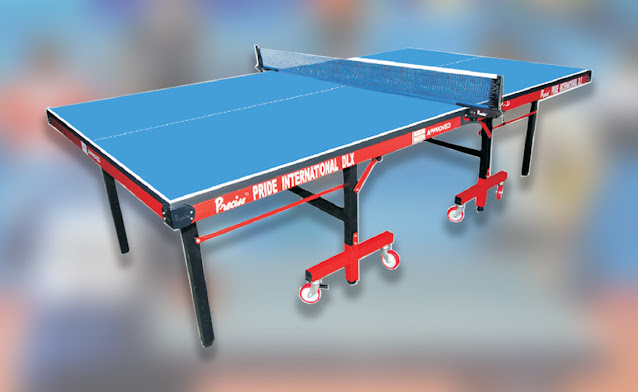How to Select a Best Table Tennis Table?
So you're looking to buy a new table tennis table? With so many options on the market these days, deciding on the best tennis table for your needs is a difficult task. There are so many different brands, price ranges, and quality levels to choose from. But what makes a table tennis table the best?
Will the gameplay be
the same on a small table as it is on a large table? Is there a better type of
table tennis table than the others?
This blog post should prove to be extremely useful in your search for the best table tennis table for your ultimate table tennis experience. In this guide, you'll learn how to find
a great table from a bad one, what features to look for when buying table tennis
table, and recommendations for different types of users, whether it's for your
club, school, home, or professional needs.
Now, let's get started
with the most important details.
How can you Identify, table tennis
table is good or not?
Checking the thickness
of the table-top is one of the best ways to identify, table tennis table is good
or not. The thickness of a table tennis table-top can range from 12mm to 25mm.
The better the quality of the table-top, the thicker it. Similarly, as you
choose thinner options, the quality will decrease.
Avoid buying tables
with a thin table tennis top (less than 12mm) because the ball will not bounce
well and the table will be flimsy and easily damaged.
A medium-thickness
table (i.e. 16mm–19mm) is quite good. The table has a consistent bounce and
lasts a long time before its quality starts to deteriorate.
Table tennis tables
with a tabletop thickness of 22mm to 25mm are the best. These are, however, the
most expensive.
A beginner player is
nearly impossible to notice the difference between a 22mm and a 25mm table, but
the 25mm table will provide you with the best table tennis experience possible.
What should you look for when
buying a table tennis table?
Table Portability
The first thing to
decide is whether you're going to set up the table permanently or if you'll be
picking it up and moving it frequently. If you're going to be moving it around
a lot, a fold-up model table is a good choice.
Because it has rollers
for easy movement, this type of table can be easily handled by one person. The
wheels on high-quality roller tables have brakes that prevent the table from
moving around while in use.
Table Thickness
Many players believe
that only table tennis tables with 1-inch thick tops are worth buying. While
such tables do have an incredible bounce, a 0.75-inch thick top provides a
similar bounce. A professional player will most likely seek out such a table
with a 1-inch thick top to simulate the feel of tournament tables.
When it comes to
selecting the best table, table thickness is a key factor to consider. The
thickness of the tabletop should be the focus for professionals, regardless of
how attractive the table looks or what brand it belongs to.
Table Legs
Because your table will
most likely take a beating over time, you should make sure it has extremely
strong legs and support. Look for the leg levelers at the bottom of the logs as
well. If the floor you're playing on isn't level, these will come in handy. The
levelers can be adjusted to keep the table's height at the standard 30-inch
height above the floor.
Leveling
Look at the table
height from all sides of the tabletop for any potential warping or bending that
could affect the ball's bounce. A spirit level with a length of one yard or one
meter can be useful for determining whether or not the table surface is flat.
Table Net
Always choose a net
with attachments and a soft covering that allows you to grip the table without
scratching the surface. If you want, you can even stick some sticky felt to the
net clamps. Also, make certain that the net clamps you're using don't dig into
the surface. When putting the net on or taking it off, never drag the net clamps.
The net and post are
included with some of the tables, while others must be purchased separately.
Final Words -
When buying a table tennis table,
be sure to specify your needs and purposes, and then select a table with the
appropriate thickness. Consider the portability, material, weight, support, net,
and other features as well.
Avoid the less
expensive options because they will not have consistent bounce and will not
provide the best playing experience. Always do a thorough search for your
options and buy the table that best suits your needs and budget.
Whatever you decide to
buy, make sure you properly care for it. Make sure to take good care of your
new table so that it lasts a long time.


Comments
Post a Comment